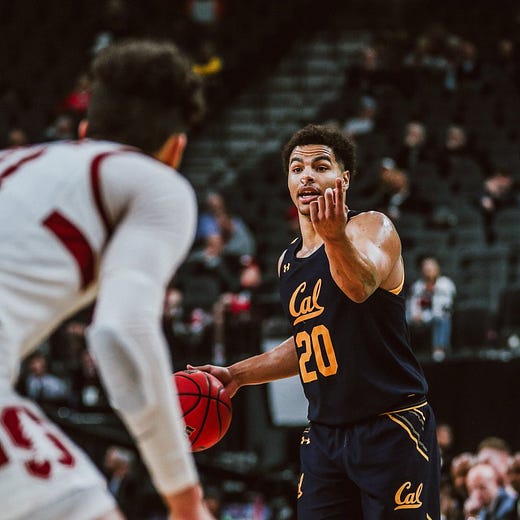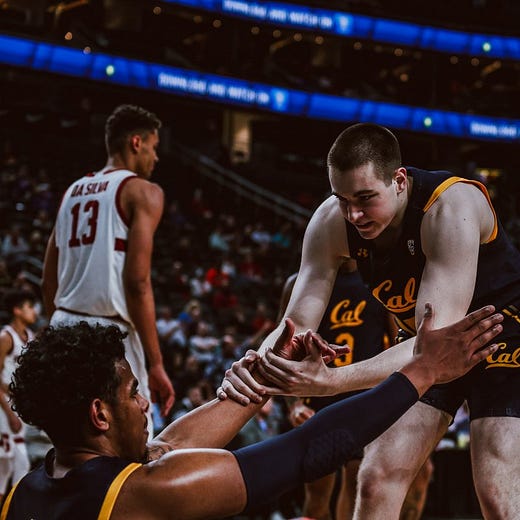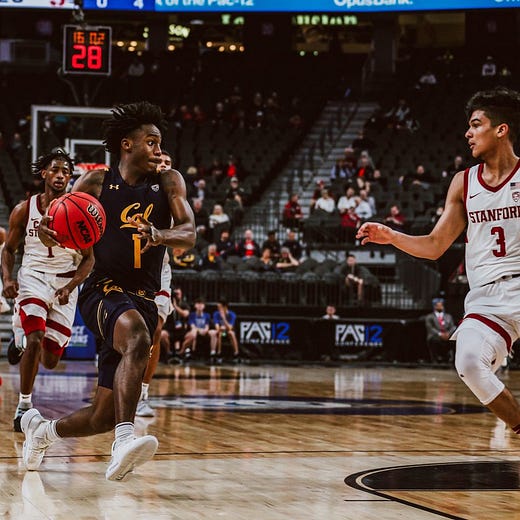What does Cal athletics want Cal men's basketball to be?
As Cal MBB enters a 5th rebuilding season, how much is Cal willing to invest to help a struggling program?
For pathological reasons, I talk about Cal men’s basketball a lot. When you write about a team multiple times per week for the better part of a decade, that team lodges itself within your brain and involuntarily forces itself into conversation.
Since some point in the winter of 2017-18, when I bring up MBB the most common response I get from other Cal fans is “why?”
Five years ago, Cal was capping off an undefeated home schedule with the highest NCAA tournament seed in program history. Cal had essentially sold out their allotment of season tickets and Haas was regularly sold out or close to it.
Now, when I tweet about games, there are like four non-reporters/bloggers who regularly respond. When we write articles here, comments are few and far between and many often come from people who openly admit they didn’t bother watching the game. Prominent basketball message boards are 6 people yelling at each other about whether or not the program is bad but salvageable, or bad and unsalvageable. Thanks to COVID we don’t have actual attendance numbers for this season, but goodness knows that crowds at Haas were not impressive last year.
In short, the vast majority of Cal fans have decided to completely tune men’s basketball out of their lives.
This sets up a hard choice for the athletic department, one that gets right at a choice that the department, and the campus at large, have struggled with for decades:
Is the goal of the Cal athletic department to maximize wins (and therefore revenue)? Or is the goal to provide for the academic development and general well-being of the players on the team?
Two years ago, Cal made the (correct) decision to fire Wyking Jones after just two years. On its face, that decision appeared to be about maximizing wins, as Cal had just endured probably the worst two year stretch in program history.
But the decision was also easy to justify from a player welfare perspective. Just one year prior, Jones processed three players off the team because he determined they weren’t good enough basketball players. Two of those players he himself had recruited just a year prior. Four more players transferred after the 18-19 season, and some of them were going to transfer regardless of who was coaching the next season.
In short, the program wasn’t healthy on the court, and it wasn’t healthy off the court, and so moving on to a new head coach could be justified from any angle.
Jim Knowlton and the Cal athletic department quickly hired Mark Fox, and if you’re judging that hire solely from the perspective of providing for the off-court well-being of players in the program, I don’t think anybody had any qualms then and I don’t think anybody has any qualms right now.
Fox’s academic record at Georgia was excellent (and the numbers started sliding as soon as he left). Since his arrival in Berkeley, roster instability at Cal has decreased. His teams play hard for him, as Cal’s efforts in the Pac-12 tournament this past week amply demonstrate. Two players who would under normal circumstances be out of eligibility, and who could easily leave this off-season, have already announced their return.
To the extent that fans can judge such things, players within the Cal men’s basketball program appear to be well-supported, and support their head coach. That matters. It’s a core expectation of any coach within the athletic department, and I don’t think anybody should be surprised that Mark Fox does it well.
For any number of reasons (we’re already paying one buy-out, Fox is Knowlton’s hire, making a change after a pandemic season is bad optics, Fox is good with academics) I would be shocked if Mark Fox isn’t back on the sidelines next year.
I also don’t expect next year’s on-court record to be significantly different than either of the first two years under Mark Fox. Fox’s three recruiting classes have all ranked somewhere between 8th and 10th in the conference in both overall score and average score/recruit, and those rankings don’t include the impact of D1 transfers, where other Pac-12 programs tend to excel as well. In short, Fox has struggled to recruit well. And while there are some potentially intriguing long term prospects in next year’s freshman class, I would be surprised if there are instant-impact players.
I hope Cal men’s basketball takes a big step forward next year. Maybe Grant Anticevich and Matt Bradley were more impacted by their individual ailments than we knew. Maybe team defense really was impacted by pre-season COVID restrictions. Maybe Monty Bowser and/or Jalen Celestine take a sophomore leap.
And I really hope they do, even beyond the normal I’m-a-fan reasons. If you watched this team day-in, day-out this year you saw how invested they were. How hard Matt Bradley cheered while he was on the bench nursing an ankle, how happy everybody was chasing Makale Foreman after his buzzer beater over USF, how invested the bench was as Cal took down Stanford in Vegas. These are the guys who signed on to try to revive Cal basketball, who stuck around when it would be easy to transfer out.
And yet, with all that said . . . if Cal MBB has a 2021-22 season that’s largely similar to 19-20 and 20-21, the athletic department will have a tough decision to make, a decision that will indicate what the goals of this administration are. If supporting their development and graduating players is enough, Mark Fox can have a lifetime contract. If winning matters, something needs to change quickly.
Can Cal have it both ways?
You may already be objecting to the thrust of this article. You’ve set up a false dichotomy, Nick! Why should Cal have to choose between academics and winning basketball games? Surely Cal can find a coach who can do both!
I don’t disagree. There’s no reason to think that Dennis Gates or Travis DeCuire or any number of hypothetical head coaches couldn’t ALSO support his players while perhaps giving Cal a better chance of winning games.
The problem is that Cal has kind of explicitly chosen one path over another. Rather than finding a way to build a practice court, Cal gave up on the project. Rather than finding ways to help players with weaker academic backgrounds graduate, Cal raised admissions standards for athletes. Rather than pay to compete on the coaching market four years ago, Cal brought in a career assistant for what I’m confident was the lowest salary in the conference. Two years later Cal brought in a veteran head coach, and his biggest selling point was program stability and graduating his players. Cal currently pays the 2nd lowest salary in the Pac-12 to their head coach.
So there’s reason to doubt that Cal would be willing to pay money to fire a coach who is successfully managing the academic side of the house, that’s the side of the house Cal has prioritized. And there’s reason to doubt that Cal has the institutional willpower or capacity to invest in the MBB program generally.
You don’t have to spend gobs of money to win basketball games - Tad Boyle is the 10th highest paid coach in the conference, for just one example. But you either need to be smart and sharp, or just plain lucky. Cal hasn’t had a drop of luck since Tennessee managed to alienate Cuonzo Martin, and Cal’s athletic department hasn’t shown much evidence that they’re going to outsmart the rest of the conference.
I still find value in closely following Cal MBB. I love watching Matt Bradley play, I like Andre Kelly’s low post game, I enjoy to look for signs of improvement in the younger players on the roster. But if you’re a casual fan who asks me why I’m talking about MBB, a fan who wants to see some sort of baseline improvement in wins and losses before paying attention again, I can’t tell you that I think the program has the institutional support needed to pull off rapid improvement.
I hope I’m wrong.






While I do think that, given the circumstances, Mark Fox deserves at least another season to see if he can lift the program back onto an upward trajectory, I also think the AD really needs to sit down with Fox and understand a) what's the plan to get to good, and b) how plausible is that plan, given the results so far? Given the first two years' worth of results, what are the odds that the program ends up posting results over the next five years that are similar to, say, Ben Braun's tenure? Is that the ceiling for the program right now? Is that enough?
After a season like ours, 12th places, fewer wins, etc, it’s understandable that fan interest is down and the short term outlook bleak
But there was one big hopeful sign... Chancellor Christ
Christ is the best Chancellor Cal has had in decades, and that includes for athletics
She is moving us to a different Title IX qualification prong (a change in strategy) requiring the (needed) SB, BVB facility upgrades, and moved a huge portion of the stadium debt off athletics books
That debt has tied our hands to do a lot of things and took a lot of negotiation with other stakeholders of the university
That debt was a major ‘institutional’ problem, although self-inflicted
Unfortunately just as that burden was lifted, we get hit by COVID which necessitated funding to be diverted to recover losses
Christ didn’t create the stadium debt problem, nor the COVID crises, nor the Title IX situation
But in a short time has developed a plan to deal with all three, plus made it easier to support grad transfers with the creation of one year grad certificate programs
But she is not a miracle worker. She needs time to clean up those messes (the biggest one was already fixed — stadium debt)
Then we can move forward with more institutional support
Fans look at Ws and Ls. That didn’t happen in this crazy year
But I’m optimistic that cal will support athletics better than in the past ... as long as Chris is our Chancellor